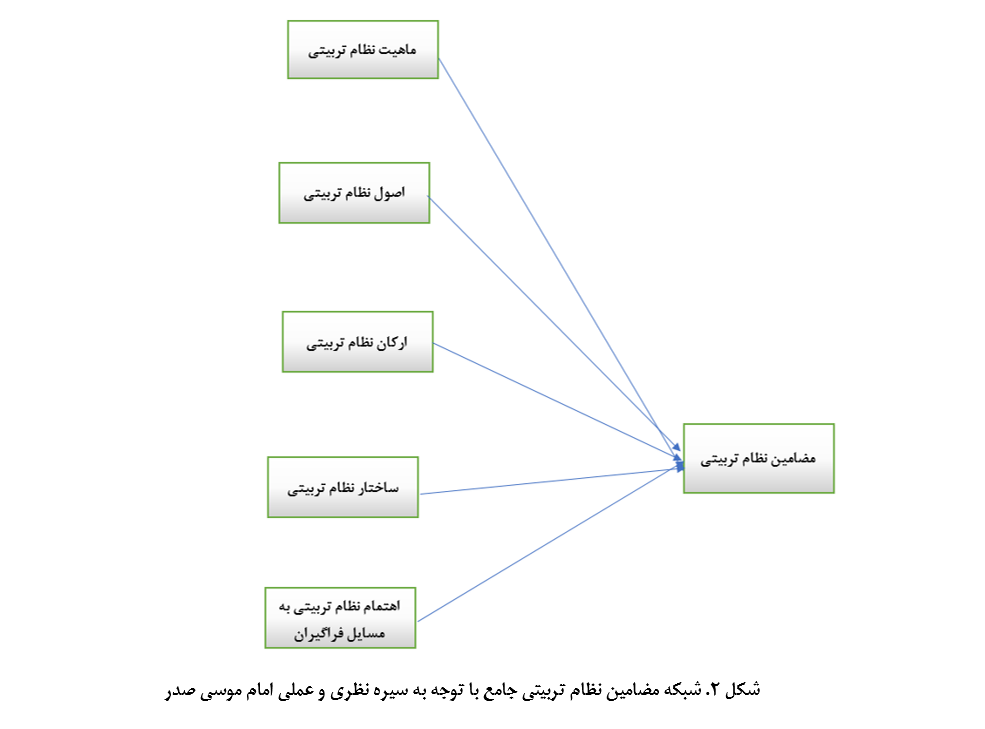Factors for Improving the Educational System with an Emphasis on the Alignment of Theory and Practice in the Thought of Imam Musa Sadr
Keywords:
Imam Musa Sadr's educational system, factors for improving the educational system, thought and character, opinion and action, EducationAbstract
The present study, based on the factors for improving the educational system with an emphasis on the alignment of theory and practice in the thought of Imam Musa Sadr, employs an analytical and interpretive approach to identify and present Imam Musa Sadr’s educational system as a framework entirely founded on divine values and human virtues. Given the significance of the orientation of the educational system and the components utilized in designing its educational models in terms of their alignment with authentic religious criteria and the fulfillment of the objectives of this intellectual system, as well as for identifying the themes of Sadr's educational system, the study utilized 14 interviews, Imam Musa Sadr’s books, and expert lectures. The findings indicate that, in Sadr’s thought, in addition to the emphasis on inherent and divine dignity, as well as the spiritual and psychological aspects of human existence, and the active and sovereign role of God in the educational system, five sub-themes have been identified as factors for improving the educational system: (1) the foundations of the nature of the educational system (Sadr’s perspectives and insights), (2) the principles of the educational system (the philosophy of Sadr’s educational system), (3) the pillars of Sadr’s educational system (the characteristics or indicators of Sadr’s educational system), (4) the structure of Sadr’s educational system, and (5) the system’s attention to learners’ issues (educational programs). Accordingly, the improvement of the educational system, with an emphasis on the alignment of theory and practice in the thought of Imam Musa Sadr, was carried out in such a way that its components interact adequately with each other to yield practical outcomes in implementation.
Downloads
References
Pazouki B. History of Contemporary Western Philosophy. Tehran: Institute for Research in Philosophy and Wisdom of Iran; 2020.
Moradi Mokhles HS, Salehi. Comparing the Effectiveness of Creative Drama and Dramatic Play Methods on Social Attitudes and Spiritual Ability. Journal of Sociology of Art and Literature. 2018;13(1):159-78.
Roznani H. Islamization of Educational and Curricular Programs. Methodology of Human Sciences Quarterly. 2002:87-329.
Daher Y. Step by Step with the Imam. Farkhiyan M, Mousavi Nejad M, editors. Tehran: Imam Musa Sadr Cultural and Research Institute; 2017.
Soleiman Nejad A. Teaching Methods of Religious Education. Tehran2014.
Mohammadi B, Mansouri B. Religious and Secular Ethics. Tehran: Young Thought Foundation; 2017.
Sadr M. The Path of Imam Sayyed Musa Sadr. Beirut: Dar Bilal for Printing and Publishing; 2014.
Sadr M. Nay and Li: Essays on Islam, Humanity, Lebanon, and Resistance. Hojjati Kermani A, editor2015.
Sadr M. Religions in Service of Humanity: Selected Speeches, Articles, Interviews, and Statements of Imam Musa Sadr. 2nd ed. Tehran: Imam Musa Sadr Cultural and Research Institute; 2016.
Sadr M. For Life. Farkhiyan M, editor: Imam Musa Sadr Cultural and Research Institute; 2011.

Downloads
Published
Submitted
Revised
Accepted
Issue
Section
License
Copyright (c) 2025 Journal of Study and Innovation in Education and Development

This work is licensed under a Creative Commons Attribution-NonCommercial 4.0 International License.










